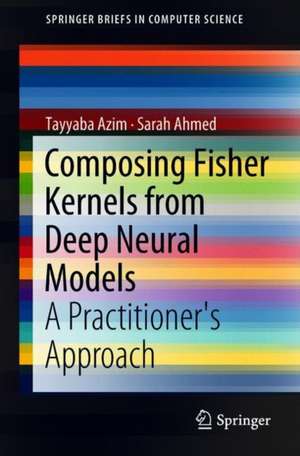Composing Fisher Kernels from Deep Neural Models: A Practitioner's Approach: SpringerBriefs in Computer Science
Autor Tayyaba Azim, Sarah Ahmeden Limba Engleză Paperback – 5 sep 2018
Din seria SpringerBriefs in Computer Science
-
 Preț: 475.83 lei
Preț: 475.83 lei - 20%
 Preț: 166.97 lei
Preț: 166.97 lei - 20%
 Preț: 325.63 lei
Preț: 325.63 lei - 20%
 Preț: 349.15 lei
Preț: 349.15 lei - 20%
 Preț: 302.49 lei
Preț: 302.49 lei -
 Preț: 381.81 lei
Preț: 381.81 lei -
 Preț: 446.47 lei
Preț: 446.47 lei - 20%
 Preț: 296.17 lei
Preț: 296.17 lei - 20%
 Preț: 335.66 lei
Preț: 335.66 lei - 20%
 Preț: 463.83 lei
Preț: 463.83 lei - 20%
 Preț: 323.00 lei
Preț: 323.00 lei - 20%
 Preț: 322.35 lei
Preț: 322.35 lei - 20%
 Preț: 321.85 lei
Preț: 321.85 lei - 20%
 Preț: 232.68 lei
Preț: 232.68 lei -
 Preț: 375.45 lei
Preț: 375.45 lei - 20%
 Preț: 323.00 lei
Preț: 323.00 lei - 20%
 Preț: 322.81 lei
Preț: 322.81 lei - 20%
 Preț: 324.17 lei
Preț: 324.17 lei - 20%
 Preț: 323.00 lei
Preț: 323.00 lei - 20%
 Preț: 322.17 lei
Preț: 322.17 lei - 20%
 Preț: 322.50 lei
Preț: 322.50 lei - 20%
 Preț: 323.34 lei
Preț: 323.34 lei - 20%
 Preț: 324.17 lei
Preț: 324.17 lei - 20%
 Preț: 323.46 lei
Preț: 323.46 lei - 20%
 Preț: 322.17 lei
Preț: 322.17 lei - 20%
 Preț: 322.02 lei
Preț: 322.02 lei -
 Preț: 341.50 lei
Preț: 341.50 lei - 20%
 Preț: 324.49 lei
Preț: 324.49 lei -
 Preț: 344.47 lei
Preț: 344.47 lei -
 Preț: 376.80 lei
Preț: 376.80 lei -
 Preț: 377.18 lei
Preț: 377.18 lei - 20%
 Preț: 324.17 lei
Preț: 324.17 lei - 20%
 Preț: 352.26 lei
Preț: 352.26 lei - 20%
 Preț: 321.32 lei
Preț: 321.32 lei - 20%
 Preț: 322.17 lei
Preț: 322.17 lei - 20%
 Preț: 324.17 lei
Preț: 324.17 lei - 20%
 Preț: 322.02 lei
Preț: 322.02 lei -
 Preț: 374.46 lei
Preț: 374.46 lei - 20%
 Preț: 320.21 lei
Preț: 320.21 lei - 20%
 Preț: 323.34 lei
Preț: 323.34 lei - 20%
 Preț: 324.17 lei
Preț: 324.17 lei - 20%
 Preț: 231.84 lei
Preț: 231.84 lei - 20%
 Preț: 294.97 lei
Preț: 294.97 lei - 20%
 Preț: 322.50 lei
Preț: 322.50 lei - 20%
 Preț: 323.46 lei
Preț: 323.46 lei -
 Preț: 374.08 lei
Preț: 374.08 lei -
 Preț: 408.23 lei
Preț: 408.23 lei - 20%
 Preț: 321.52 lei
Preț: 321.52 lei - 20%
 Preț: 323.34 lei
Preț: 323.34 lei - 20%
 Preț: 323.00 lei
Preț: 323.00 lei
Preț: 286.19 lei
Preț vechi: 357.74 lei
-20% Nou
Puncte Express: 429
Preț estimativ în valută:
54.77€ • 59.47$ • 46.01£
54.77€ • 59.47$ • 46.01£
Carte tipărită la comandă
Livrare economică 19-25 aprilie
Preluare comenzi: 021 569.72.76
Specificații
ISBN-13: 9783319985237
ISBN-10: 331998523X
Pagini: 70
Ilustrații: XIII, 59 p. 6 illus., 5 illus. in color.
Dimensiuni: 155 x 235 mm
Ediția:1st ed. 2018
Editura: Springer International Publishing
Colecția Springer
Seria SpringerBriefs in Computer Science
Locul publicării:Cham, Switzerland
ISBN-10: 331998523X
Pagini: 70
Ilustrații: XIII, 59 p. 6 illus., 5 illus. in color.
Dimensiuni: 155 x 235 mm
Ediția:1st ed. 2018
Editura: Springer International Publishing
Colecția Springer
Seria SpringerBriefs in Computer Science
Locul publicării:Cham, Switzerland
Cuprins
Chapter 1. Kernel Based Learning: A Pragmatic Approach in the Face of New Challenges.- Chapter 2. Fundamentals of Fisher Kernels.- Chapter 3. Training Deep Models and Deriving Fisher Kernels: A Step Wise Approach.- Chapter 4. Large Scale Image Retrieval and Its Challenges.- Chapter 5. Open Source Knowledge Base for Machine Learning Practitioners.
Recenzii
Notă biografică
Dr. Tayyaba Azim is an Assistant Professor at the Center for Information Technology, Institute of Management Sciences, Peshawar, Pakistan.
Sarah Ahmed is a current research student enrolled in Masters of Computer Science program at Institute of Management Sciences Peshawar, Pakistan.
She has received her Bachelor’s Degree in Computer Science from Edwardes College, Peshawar,Pakistan. Her areas of interest include: Machine Learning, Computer Vision and Data-Science. Currently, her research work is centered around the feature compression and selection approaches for Fisher vectors derived from deep neural models. Her research paper: "Compression techniques for Deep Fisher Vectors" was awarded the best paper in the area of applications at ICPRAM conference 2017.
Sarah Ahmed is a current research student enrolled in Masters of Computer Science program at Institute of Management Sciences Peshawar, Pakistan.
She has received her Bachelor’s Degree in Computer Science from Edwardes College, Peshawar,Pakistan. Her areas of interest include: Machine Learning, Computer Vision and Data-Science. Currently, her research work is centered around the feature compression and selection approaches for Fisher vectors derived from deep neural models. Her research paper: "Compression techniques for Deep Fisher Vectors" was awarded the best paper in the area of applications at ICPRAM conference 2017.
Caracteristici
Presents a step-by-step approach to deriving a kernel from any probabilistic model belonging to the family of deep networks Demonstrates the use of feature compression and selection techniques for reducing the dimensionality of Fisher vectors Reviews efficient algorithms for large-scale image retrieval and classification systems, including concrete examples on different datasets Provides programming solutions to help machine learning practitioners develop scalable solutions with novel ideas
